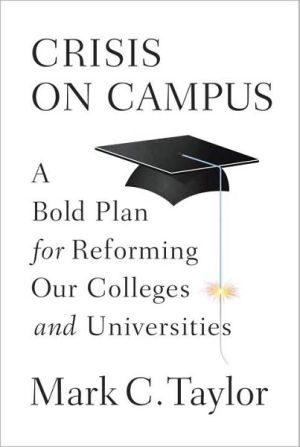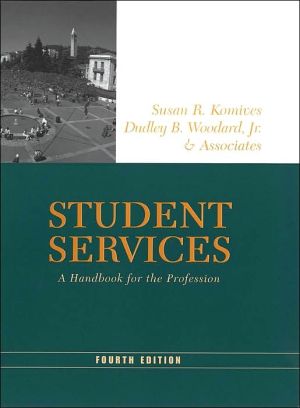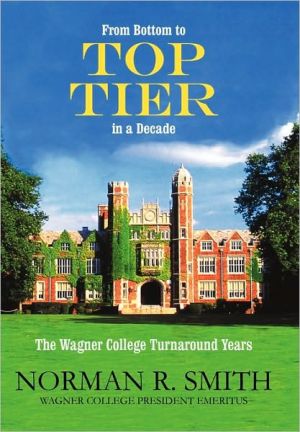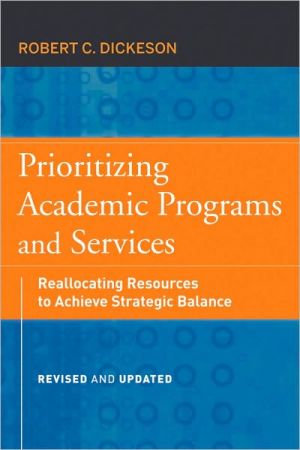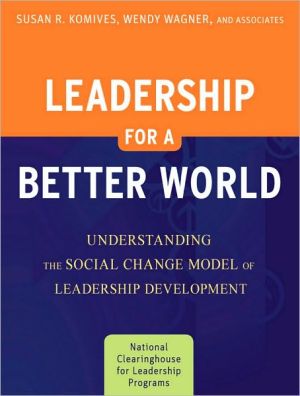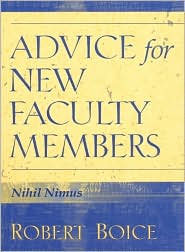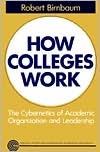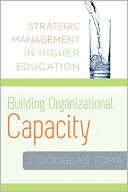Liberal Education and the Public Interest
In 1996 James Freedman published Idealism and Liberal Education, which discussed the ideals that shaped his life as an intellectual, a law professor, and a college and university president. In this new collection of essays, he convincingly explores his firm belief that a liberal education is the “surest instrument yet devised for developing those civilizing qualities of mind and character that enable men and women to lead satisfying lives and to make significant contributions to a democratic...
Search in google:
In 1996 James Freedman published Idealism and Liberal Education, which discussed the ideals that shaped his life as an intellectual, a law professor, and a college and university president. In this new collection of essays, he convincingly explores his firm belief that a liberal education is the “surest instrument yet devised for developing those civilizing qualities of mind and character that enable men and women to lead satisfying lives and to make significant contributions to a democratic society.”Freedman concentrates directly upon the problems facing university presidents and all university administrators. A passionate and beautifully written argument for the benefits of a liberal education, this book Library Journal Most of today's college students set their sights on a specialized field of study instead of using their college years to broaden their minds-a big mistake, claims Freedman, a former president of Dartmouth College and author of Idealism and Liberal Education. Freedman presents seven essays on varied topics, including higher education's contributions to society, the value of intellectuals to democracy, the importance of risking political and social disfavor to defend important principles, and, most significantly, the importance of preserving a true liberal education, demonstrating how it nurtures independent thinking and is vital to a strong, democratic society. The chapter "Celebrating Intellectuals" concentrates on four books that stress the role of intellectuals in providing a more democratic citizenry, while "Appraising Significant Lives" discusses role models who have encouraged and inspired students. Best suited to administrators in higher education, this is an alternative purchase for academic libraries.-Terry Christner, Hutchinson P.L., KS Copyright 2003 Cahners Business Information.
LIBERAL EDUCATION AND THE PUBLIC INTEREST \ By JAMES O. FREEDMAN \ UNIVERSITY OF IOWA PRESS Copyright © 2003 James O. Freedman\ All right reserved.\ ISBN: 978-0-87745-825-8 \ \ \ \ Chapter One MOUNTING THE PUBLIC STAGE \ College and university presidents occupy prominent, even prestigious, positions in their communities and in society at large. Yet to many citizens they are strangely invisible and oddly silent on many important public issues. They are not often counted among society's public intellectuals. This has not always been the case, and it is worth asking why the change has occurred.\ Having served for sixteen years as the president of two institutions-one a public university, the other a private college-I have perforce had many opportunities to think about the role of college presidents in the public life of the nation.\ In earlier periods, college presidents regularly served for two or three decades. Today the average tenure is thought to be six or seven years, although some presidents now serve second or even third presidencies. Two-thirds of the presidents of the thirty-one private institutions that constitute the Consortium on the Financing of Higher Education (COFHE) typically have taken office within the last five years.\ Although it is hazardous to generalize about presidents as a class if only because they serve at more than three thousand very different institutions, it can safely be said that for many presidents today the jobs are simply too demanding to sustain for an extended period of years. These presidents determine after a few years of service that their constituencies are routinely mutinous, their hold on office insufficiently secure, and their daily satisfactions depressingly few to justify the burdens and frustrations of office. They conclude, as A. Bartlett Giamatti ruefully introduced his book A Free and Ordered Space (1988), "Being president of a university is no way for an adult to make a living."\ It has not always been so. When Charles W. Eliot announced his retirement as president of Harvard in 1909, he said, "The occupation which has been mine for a lifetime has been a most pleasant one, and I regret that it is about to terminate. Forty years of service has been given me in the pursuance of a profession that has no equal in the world." My speculation is that few college presidents would leave office today in such a generous frame of mind. We need to ask why college presidencies are not more stable and more satisfying, and what consequence this circumstance may have for the leadership of our colleges and universities, as well as for the public life of the nation.\ The expectations of the office, to begin with, are so inflated as to be virtually impossible to meet. Humorous descriptions, barely concealing the truth, abound. Henry Wriston, who served as president of Brown University for many years, once noted that a university president should "speak continuously in words that charm and never offend, take bold positions with which no one will disagree, consult everyone and follow all proffered advice, and do everything through committees, but with great speed and without error."\ In the days before many women had become chief executives, Clark Kerr, the former president of the University of California, added that a university president was expected to be, among other things, "a friend of the students, a colleague of the faculty, a good fellow with the alumni, a sound administrator with the trustees, a good speaker with the public, an astute bargainer with the state legislature, a friend of industry, labor, and agriculture, a persuasive diplomat with donors, a champion of education, a supporter of the professions (particularly law and medicine), a spokesman to the press, a scholar in his own right, a public servant at the state and national levels, a devotee of opera and football equally, a decent human being, a good husband and father, an active member of a church, and a person who enjoys traveling in airplanes and eating his meals in public."\ Finally, the search committee that ultimately selected A. Whitney Griswold as president of Yale University agreed that it was looking for "a leader, a magnificent speaker and great writer, a good public relations man and fund raiser, a man of iron health and stamina, married to a paragon - a combination of Queen Victoria, Florence Nightingale, and best dressed woman of the year - a man of the world but with great spiritual qualities, an experienced administrator who can delegate authority, a great scholar, and a Yale man." The committee recognized that "there is only One who has most of these qualifications." But then it asked itself, "Is God a Yale man?"\ These high expectations are mocked by reality. They inevitably encourage the steady round of criticism that may be foremost among the possible explanations for the brief tenure of presidents. President Eliot surely must have experienced occasional moments of darkness during his forty years in office - moments of conflict, disappointment, and failure - but one can be confident that he did not experience the constancy or intensity of criticism that his present-day successors typically undergo.\ The available grounds for criticizing college presidents are many: leadership style, educational philosophy, financial competence, public-speaking skills, fund-raising effectiveness, relationships with alumni, availability to students. In an era in which many constituencies believe that they have a significant stake in the fortunes of a college, a president is exposed on virtually every side. In my experience, the complaints, if not quite criticisms, are so constant and diverse that at times of exasperation I wished I had had the courage to follow Edmund Wilson's truculent example of printing postcards that read "Dear Sir: You may well be right. Sincerely."\ There is, of course, a relationship between the relatively short average tenure of college presidents and the breadth of the constituencies whose members believe they have the right to criticize presidents. The greater the sources and volume of criticism, the more painful the stress that presidents (and their family members) suffer and the briefer their tenure is likely to be. Perhaps this has ever been so. When Daniel Dana resigned as president of Dartmouth College in 1822 after only eleven months in office, he told the board of trustees, "This College, Gentlemen, needs a president not only of powerful talents, but of strong nerves." But it is more acutely so today than it was a half century ago.\ In the face of recurring criticism from manifold sources, upon whom can a president reliably count for support? Two immediate possibilities are her faculty and her board of trustees.\ Faculty members always have ambivalent feelings toward their president. They look to him for leadership at the same time that they resent his efforts to disturb them professionally. They jealously guard their own institutional prerogatives, and praise collegial governance for its tendency toward a horizontal hierarchy of power. To many faculty members, the president represents a contending professional class; to others, he seems largely irrelevant, needed primarily for ceremonial and fund-raising purposes. Often faculty members joke about the president's constant absence from campus and highlight the rare occasions upon which he is sighted. Yet in auspicious circumstances, presidents of unusual character, vision, and eloquence can appeal successfully to the most independent of faculties. John Kenneth Galbraith captured the balance well when he wrote, "A college president can lead a faculty but he cannot defeat it." However, the task is difficult.\ In order to lead a faculty, a president must establish herself as a colleague. She must be able to engage with its members intellectually and to devote a part of her month to attending faculty seminars and colloquia. She must take the initiative in learning of individual faculty members' academic interests, reading the books they have written as well as the serious books of the moment that they are reading. In short, she must establish that she appreciates the dignity of the academic life and is worthy of respect on the academy's terms. These efforts take time - uncluttered, untroubled, unhurried time - and that is precisely what the complexity of her position often denies a president.\ A board of trustees of constancy and fortitude can support a president in ways that nourish his efforts and prolong his tenure. The most important function of a board is to work collaboratively with the president to examine the strength and long-range opportunities of the college and to develop a clear vision, always subject to midcourse modification, of the goals that the college seeks to achieve. In the end, it is the board that has the best opportunity to see the future of the college as a whole, unlike other groups, such as alumni and students, that see it only from afar and sporadically or from too near and constantly. The board must then have sufficient confidence in its goals to preserve that larger perspective during the periodic storms of criticism that a college may face. Unfortunately, some boards grow weary of conflict among the college's constituencies and, rather than staying the course, seek the relief of resolution by abandoning the president prematurely.\ I want to address a particular form of criticism that is increasingly directed against even those college presidents who serve for relatively substantial lengths of time: that they do not use their positions as bully pulpits to speak out on important issues of the day. I choose this particular criticism because most college presidents enter upon their service with the expectation that participation in public discussion will provide them with a wider audience for their views and be one of the most rewarding aspects of their tenure.\ College presidents of the present generation are frequently compared unfavorably to presidents of bygone eras - eras in which, it is said, giants walked the land. "A generation ago ... college and university presidents cut striking figures on the public stage," a journalist for the New York Times has lamented. "They called for the reform of American education, proposed safeguards for democracy, sought to defuse the cold war, urged moral standards for scientific research, and addressed other important issues of the time. Today, almost no college or university president has spoken out significantly ... about dozens of ... issues high on the national agenda."\ Criticisms of this nature are easily lodged and may even be true, but there is much more to be said if the reasons underlying the truth are to be understood. College presidents of a prior era were, indeed, prominent figures in the public life of the nation and of their communities. These titans - or at least some of them - wrote shelves of books, published articles in the Atlantic Monthly and Scribner's Magazine, advised presidents of the United States, and chaired national commissions. In the nineteenth century, some took an active part in politics; Charles W. Eliot of Harvard, Mark Hopkins of Williams, Andrew D. White of Cornell, and Theodore Dwight Woolsey of Yale were conspicuous participants in Republican party activities. Those who served at the most prestigious institutions were members of the country's unofficial House of Lords: of eminent dignity and beyond popular election.\ Nicholas Murray Butler, the legendary president of Columbia University, is a good example. Even H. L. Mencken, who did not hold college presidents in high esteem, gave grudging praise to Butler. "As a class," Mencken wrote of college presidents, "they are platitudinous and nonsensical enough, God knows. But there is at least one among them, Dr. Nicholas Murray Butler of Columbia, who actually says something when he speaks."\ Not least among Butler's remarkable accomplishments was his longevity in office. He became president of Columbia in 1902 when he was forty; he retired in 1945 when he was eighty-three. Although often derided for his authoritarian style, Butler was praised by many intellectuals - including Henri Bergson, H. G. Wells, and Benjamin N. Cardozo - for his powerful qualities of mind. In his two-volume autobiography, appropriately entitled Across the Busy Years (1939- 40), Butler described how he managed, for more than four decades, to combine his responsibilities as president of Columbia with a vast range of public activities.\ Throughout his career at Columbia, Butler spoke out on domestic issues and played a significant role in national Republican politics. He was an adviser to Presidents Roosevelt, Taft, and Harding, and campaigned vigorously for the repeal of Prohibition. In 1912 he was William Howard Taft's vice-presidential candidate on the Republican ticket. And in 1920 he was considered a serious contender for the Republican presidential nomination; the New York Times endorsed his candidacy, calling him "undoubtedly the best fitted of all candidates."\ Butler's role in the public discussion of foreign affairs was even more prominent. For the last twenty years of his presidency of Columbia, he served simultaneously as president of the Carnegie Endowment for International Peace. Before the onset of World War I, he called for the use of military force and economic sanctions against nations that invoked military power. After the war, he spoke out against United States participation in the League of Nations on the terms negotiated by Woodrow Wilson. In 1927, he became perhaps the most influential public advocate of the Kellogg-Briand pact, which renounced war as an instrument of international diplomacy. For his efforts on behalf of disarmament and world peace, he was awarded the Nobel Prize for Peace in 1931.\ The career of A. Lawrence Lowell, president of Harvard University from 1909 to 1933, is equally revealing. Throughout the twenty-four years of his tenure, Lowell often mounted the public stage. He took strong stands on public issues. He favored American participation in the League of Nations, which he regarded as essential to world peace, and was an outspoken critic of the New Deal, which he feared would undermine individual responsibility and initiative, and of labor unions, which he believed promoted organized selfishness. Having been trained as a lawyer, Lowell spoke out against President Wilson's appointment of Louis D. Brandeis to the United States Supreme Court, ostensibly because he thought Brandeis did not enjoy the confidence of the bar. However, many thought he objected to the appointment because he rejected Brandeis's progressive political and social views and because Brandeis was a Jew.\ On some occasions, Lowell entered public controversy even though he clouded Harvard's reputation by doing so. In 1927 he served, by appointment of the governor of Massachusetts, as the chairman of a three-man committee to review the convictions of Nicola Sacco and Bartolomeo Vanzetti, who had been sentenced to death for the murder of two men during a payroll robbery. Having reviewed the transcript of the trial and the evidence presented, and being aware of the fact that the presiding judge had publicly boasted of having convicted "those anarchist bastards," the committee concluded that both men had received a fair trial. Sacco and Vanzetti were executed. Controversy about the Sacco-Vanzetti case (memorialized in a series of powerful gouache paintings by Ben Shahn) followed Lowell for the rest of his life. The historian Ernst Earnest concluded that "Lowell will go down in history" not as an educator "but as the man who sent Sacco and Vanzetti to death." The episode serves as a cautionary reminder that when a president mounts the public stage, he runs risks, both for himself and his institution.\ The assurance that Lowell felt in inviting notoriety by his outspoken participation in public affairs doubtless derived in part from the self-confidence he enjoyed as a member of Boston's Brahmin elite; he did not, as one historian has written, shy away from the personal pronoun. But that assurance also derived from the public expectation that college presidents, especially the presidents of leading colleges, would address vital issues of the day - would act in their capacities as citizens quite apart from their capacities as educators.\ (Continues...)\ \ \ \ Excerpted from LIBERAL EDUCATION AND THE PUBLIC INTEREST by JAMES O. FREEDMAN Copyright © 2003 by James O. Freedman. Excerpted by permission.\ All rights reserved. No part of this excerpt may be reproduced or reprinted without permission in writing from the publisher.\ Excerpts are provided by Dial-A-Book Inc. solely for the personal use of visitors to this web site.\
Preface1Mounting the Public Stage12Defending Higher Education253Preserving Liberal Education544Celebrating Intellectuals715Appraising Significant Lives826Addressing Moral Questions1027Conferring Honorary Degrees117Selected Bibliography133Index137
\ Library JournalMost of today's college students set their sights on a specialized field of study instead of using their college years to broaden their minds-a big mistake, claims Freedman, a former president of Dartmouth College and author of Idealism and Liberal Education. Freedman presents seven essays on varied topics, including higher education's contributions to society, the value of intellectuals to democracy, the importance of risking political and social disfavor to defend important principles, and, most significantly, the importance of preserving a true liberal education, demonstrating how it nurtures independent thinking and is vital to a strong, democratic society. The chapter "Celebrating Intellectuals" concentrates on four books that stress the role of intellectuals in providing a more democratic citizenry, while "Appraising Significant Lives" discusses role models who have encouraged and inspired students. Best suited to administrators in higher education, this is an alternative purchase for academic libraries.-Terry Christner, Hutchinson P.L., KS Copyright 2003 Cahners Business Information.\ \

